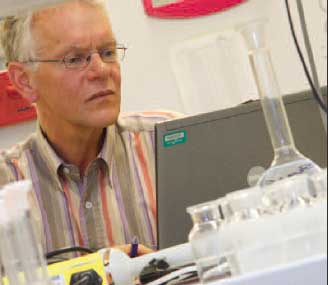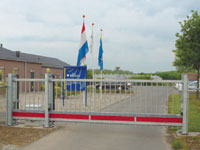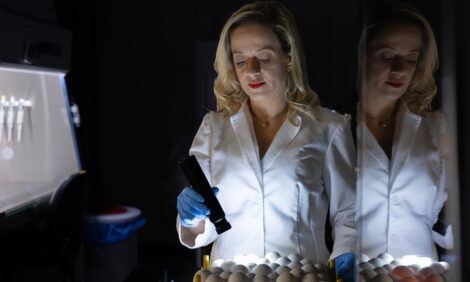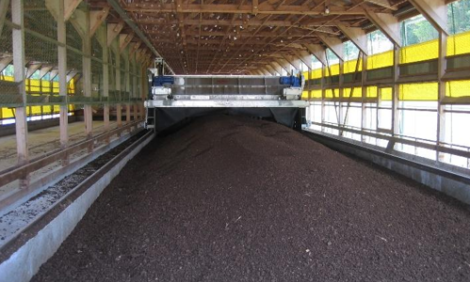



Genomics Research Project: Early Success for Cobb-Hendrix Alliance
Jerry Moye, president of Cobb-Vantress, and Antoon van den Berg, chief executive of Hendrix Genetics are interviewed by Roger Ransom in the current issue of Cobb Focus.It is a year since the alliance between Cobb-Vantress and Hendrix Genetics was announced, with Hybro acquired by Cobb and the $10 million genomics research programme under way. In this wide-ranging interview, Jerry Moye, president of Cobb-Vantress, and Antoon van den Berg, chief executive of Hendrix Genetics, give Roger Ranson their opinions on how the alliance is progressing and their hopes for the future.

(Picture: World Poultry)
Let's start by looking at the past 12 months. Have you achieved what you expected a year ago?
Jerry Moye (JM) I would say that we have very much achieved what we wanted. We are very excited about having Hybro as part of our company with the people, the facilities and the genetics lines that have come with it. We think this is a great opportunity. The genomics research project with the USDA certainly exceeds what we had hoped to be able to do, and the fact that it has come together so quickly has been a real boon to us. I think it tells us what we have the capability to do jointly from an R&D standpoint.
Does that match your expectations, Antoon?
Antoon van den Berg (AvdB) Yes, my views are more or less in parallel. I think such an alliance on R&D is theoretically possible as competitors – but not so easy because at the end of the day breeding is at the heart of the company.
This project has come as an early success in the strategic alliance, which is motivating for both companies. I do agree with Jerry it exceeded our expectations in coming so quickly, it is substantial and it is absolutely at the heart of our strategic alliance.
Going back to Hybro, Jerry. Will we still see the Hybro products available across the world over the next year or two?
JM Absolutely, we are continuing to supply these products. We have several key markets where we are interested in continuing with Hybro – obviously Brazil being one of the big ones – but we are going to continue with the genetics programme at the Herveld farm in the Netherlands. We will try and develop some of our Cobb procedures that may not be in place there and that has already started. In fact, we've had some of our R&D people there and we've had some of the team from the Herveld farm with us in the US, so we're very excited about what that's going to mean for us.
Does that mean actually swapping the pedigree lines between the two countries?
JM No, we're still some time away from that, we are going to need more time to do some line-by-line assessments. We've only at this point been able to complete one trial with both Hybro and Cobb lines in a chicken house to compare. Obviously we've got many more scheduled, but I don't anticipate we will be moving lines around for another eight or nine months.
Antoon, what was the reaction from your customers when you told them that Hybro was going to become part of Cobb and no longer part of Hendrix?
AvdB First of all, the relations in breeding are very personal and very long standing so of course, this came as a bit of a shock. Clients are in general competitors with each other and are involved with the same suppliers, so there needs to be some time to adapt. Cobb has been very clear from the beginning that they will continue with the Hybro product and the brand, but the company will be integrated, just as we have done in our own acquisitions.
In our case, it is only three years since the ISA acquisition and we are starting to see the first results now, so that takes time, breeding is a slow business. So I believe Cobb has done the right thing with the company, the people in Holland will gradually adopt the Cobb colours and the Cobb mentality, and they join a winner in the sector. So for the people, it is a change but a good experience, and the clients will see the fruits of this in time because with their expertise Cobb will be able to make better use of the Hybro lines than we could have done alone.
Is that how you see things too, Jerry?
JM Absolutely, Roger. Some of the customers have expressed to us that they would like us to move faster but there is no short cut in the breeding programmes. You have to understand the lines, we have no reference from historical perspectives around the Hybro lines and it's going to take us some time to achieve that. I do believe completely that the more we are able to put, let's say, Cobb's type programmes around things like yield and feed conversion, and use them on these lines, the more I'm excited about what it's going to mean for those products. But it just can't happen overnight.
* "I strongly believe that the R&D component is the main driver behind the concentration process. Some companies can pay for it and others can't. It's as simple as that." |
|
Antoon van den Berg
|
Going back to Antoon, you said that breeding is by its very nature a fairly slow, long term business, but how soon do you see benefits coming out of the ten-million-dollar genomics research programme you are undertaking over the next five years? How soon will we see some products for the customer to start trialing on their farms?
AvdB That might be even slower than the integration of the broiler line. The ten-million-dollar project, what is that, basically? It is validating genomic analysis to breeding progress, so first of all you have some years of internal testing of the validity and the accuracy of your selection. Up until now, we were selecting on the phenotype of the animal itself, and we were selecting on phenotypes of the sibling, which with BLUP programmes and computer programmes you relate to estimating breeding values.
Now you have the new dimension that is genomic selection, and this is basically looking into the gene map of the animal, and based on that you can say there you are, you can take blood samples and estimate what will these animals do later on. So what are the advantages? You improve accuracy and you shorten the generation interval but before you can do this in a practical and responsible way, you need to build up experience during a number of years.
I think you had been talking about doing a certain amount of research on DNA technology yourselves before this was announced. How much have you been doing as a separate company at Hendrix?
AvdB It was basically done in Euribrid Nutreco, and it was fortunately for Cobb done on a broiler line. So we have hands-on expertise and we have proof that genomic selection will provide reliable information to improve your selection, that is not an uncertainty anymore. Now you have to take thousands of samples of individual lines to map them out, to compare them with historical performance and make the correlations. What you will see is increased success in genetic selection, it increases the speed, basically instead of running a motor at 100 km an hour you run a motor at 150 km an hour.
Which traits in particular would you look to make the first gains on using this technology?
AvdB First of all, I am not going to disclose which traits we are particularly focusing on but in general terms I can say the traits we are always interested in are the economic traits, so feed conversion, mortality and that kind of thing. So we will speed up progress on the normal traits but it is particularly valid for traits which you cannot measure so easily in the standard selection programs which we have done so far.
That is like, for instance, behaviour, mortality, disease resistance – traits that in today's breeding programmes cannot be measured so easily. Behaviour is today not easy to measure and we cannot always say that animals have the behaviour we would wish them to have. We can do disease challenges on offspring but you cannot do it on the breeder parents themselves because the moment you have exposed them to diseases, you cannot use them for breeding anymore. So, if you could measure disease resistance in the animal itself by a blood sample and later on just continue with this animal, that would be a big help of course.
* "I believe that there is potential to deliver the same kind of value in some of the other species they are already involved in, so I think it's just a logical progression " |
|
Jerry Moye
|
So, Jerry, I know you have spoken before about the benefits that you see, I think particularly in terms of health and welfare, but if you got a particular benefit in terms of disease, wouldn't that give you a huge advantage in terms of the market?
JM Roger, without question it would but to me the genomics thing is a bit like a media sensation right now. Everybody is excited about opportunities and they have seen an announcement that we're making an investment together in working with the USDA on this big project. There isn't going to be any short cuts unfortunately, I believe that it will take us several years in that project to just understand - are you going to be able to use genomics to make selection?
And then, as Antoon says, after you have that answer, you have to do that parallel assessment. So you find a marker and then does that selection point mean the same as when you do feed conversion now. Will you get the same result? That's a very important thing and it will take more time.
The work that has been done to this point over the last two or three years has been building the library of information and 'snips' or markers that describes what your chicken is about. Now you can take it steps further, but we've still got quite some time before we're going to get to a point where you can seriously talk about a true return.
AvdB On disease resistance in general, let's not raise the expectations that we are breeding animals, which will be resistant against avian influenza (AI) because the viruses mutate more rapidly than we are able to select for favourable genes in the animals themselves. So with disease resistance particularly, you do get differences between lines but don't expect wonders. We shouldn't raise too much expectation and then be disappointed. I can remember going back looking at wheat breeding, there was a move some years ago to breed varieties that were resistant to one particular disease and that could then get broken down as you said by mutation and the disease resistance becomes negated. I think there was then a move to breed more of a wider multi-gene resistance making it more robust. Is that maybe the approach that you would take perhaps, Jerry, in terms of getting a direct benefit from this disease resistance?
JM Roger, you're asking a non-scientist to give you a scientific answer! The simple answer is, of course, we want to really breed a bird that is as robust as possible and handles a variety of challenges, whether they happen to be from viruses or bacteria. We want to be as capable in disease resistance as possible and that's the challenge I think to this point. If you talk to some of our geneticists, they could tell you that you might be able to tackle a particular disease today in traditional selection. OK but you are likely going to compromise yourself against something else by doing that. So the real challenge is how do you build a programme that allows you to give the broadest range of protection or good health that you can in the birds you produce.
AvdB Once again, don't expect a wonder bird. You will get faster genetic progress in a balanced way, a more controlled and more predictable way. We should be careful to compare plant breeding with animal breeding; disease resistance in plant breeds is often based on one single gene and such a single gene can easily be circumvented by a mutation in a virus. In animals, we usually deal with mechanisms controlled by many genes, which makes genetic selection harder and slower but the result will be more stable and robust.


Now we know this is going to be affecting both broilers and layers with the work you are doing but you are also involved, Antoon, in pigs. Is it going to be extended at some point into looking at the pig world, as to how it might have benefits there?
AvdB Both companies – Cobb and Hendrix Genetics – believe in multi-species and why do we believe in multi species? We are faced with an exponential increase in cost of R&D, and that is non-species-specific, so if we run out a programme on broilers and layers, those results are transferable to the other species. If you find genomic selection is working and it's working for instance with certain traits better than with other traits, then I think more or less automatically, you can assume that it is also the case in the other species. So there is rationale and the interest on both sides to work on those species.
If we look in the poultry world, the concentration process is largely finished, I would say. Our German friends and ourselves, we are both I think investing quite a sum of money and are competing heavily on product quality. I strongly believe that the R&D component is the main driver behind the concentration process. Some companies can pay for it and others can't. It's as simple as that.
But, Antoon, you are a company involved in poultry and in pigs, Jerry, at Cobb, you are involved simply on the poultry side. Do you see Cobb perhaps coming a multi-species company in the future?
JM That is our hope, Roger, and we don't want to overlook the fact that as you know we are a part of Tyson Foods and Tyson Foods is already a multi-species company. We provide value to them not just as a stand-alone business unit but to the original core business of Tyson of producing broilers. You know their investment in Cobb years ago was based on the fact that they saw the value of the genetics to their business. I believe that there is potential to deliver the same kind of value in some of the other species they are already involved in, so I think it's just a logical progression that we move forward with that.
Can we turn now to more general things for a few moments. Antoon, first how much have your plans been affected by the downturn in the global economy looking at the global poultry world that you are in?
AvdB If you look at the global economy, personally I believe that for our company Hendrix Genetics – and I guess it is the same for Cobb as a breeding company – we are much more affected by what happened in the last two years with adverse feed prices. Basically, our clients, who are mainly vertical integrators, were not able to transfer the increased feed costs to consumer prices, and that means that worldwide in every country and affecting all species our clients were suffering heavily. You see that in decreased profitability and, if you are not careful, increased debtors on our side and reduced replacements. If we looked at the financial crisis and the long term impact, I don't know because will it lead to reduced consumption? But there are, for our company at least, two very positive effects: the feed prices or commodity prices are decreasing rapidly so that it is positive news for our company and our clients. The second thing that is positive for us – probably for Cobb negative – is the fact that the dollar strengthens and the euro weakens.
For Hendrix Genetics, we have mainly our R&D and production bases in euro or euro-related countries, a big chunk of our sales is also dollar related currency, so yes the currency movements are for us at the moment positive but they were quite negative in the last two years. So, the immediate impact of today's financial crisis I would consider positive for our company, but in the medium term in countries where there is huge expansion based on new projects like east Europe and also in Asia, I would expect that this might slow down a little.
How do you see things, Jerry, with the dollar of course being the home currency for Cobb?
JM Just the reverse of what Antoon said. Over the last year, it's had a positive impact on our business because of the weakening of the dollar compared to sterling, the euro or even the Brazilian real. That has changed a little bit as we go forward but to me, the more important thing – and I can only really speak for the broiler business – is that it is going to force the industry to do some things they need to do and that's going to be balancing supply and demand.
I think we're faced particularly in the United States today where we've got more chickens than we should have: there are inventories there in freezers and things like that that we need to correct. It's been a real battle, as Antoon says. You hate to be working with customers that are struggling in their business but we are seeing steps taken in the United States. I would say 2009 volumes will be less than they were in 2008, and by the middle of the year, I am hopeful that there will be a reaction to that change in the supply side of the equation. So there is still going to be some tough periods in the US between now and then.
But what about the global markets where perhaps there is growth in some of the other countries?
JM I think there is growth in some of the other countries but I do think it's going to be tempered a little bit by whether or not the people have cash in hand. As we see today, credit is going to be tough to come by and I think new projects are going to be difficult to get going. But if you've got cash right now, I think it's an opportunity for you to grow your business. I think that globally, consumption of chicken meat is still very strong and I think there is reason to see it continue. As feed prices go up, we do not want to ignore the fact that it's going up on the larger animals as well. So when you look at protein to protein, chicken is still a relatively good buy for a consumer.
March 2009








